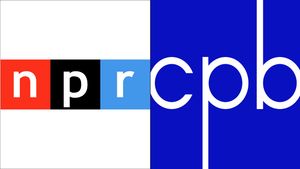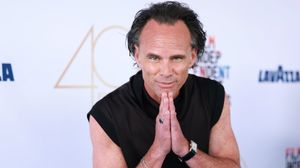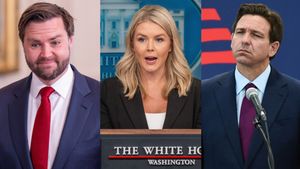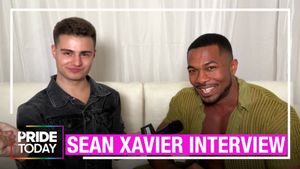On Tuesday April 28, 2015, the morning of the Supreme Court oral arguments on what could be the decisive marriage case, Mary Bonauto woke early at the Residence Inn in downtown Washington, DC, after a difficult night of sleep. But that was something the Gay & Lesbian Advocates & Defenders attorney who had been carefully stewarding the movement's legal strategy on marriage for years had grown accustomed to after having been selected to argue the marriage case before the Supreme Court just a month before. She'd been holed up at the hotel for nine days, and every morning she'd woken at dawn and spent the day reviewing cases and briefs, prepping for potential questions from justices, and practicing the points she wanted to make. She knew that her main job in oral arguments was to drive home the points that would advance the ball while conceding nothing that could harm the case.
Mary had completed several practice or moot courts, including one where five conservatives acted as justices and grilled her for more than an hour. In fact, most of her contact with the outside world was with other attorneys on the case, including her colleagues from LGBT legal organizations (who were in Washington with her), a couple of Supreme Court experts, and Douglas Hallward-Driemeier, who would argue another part of the case. All had helped her hone her arguments.
The night before the big day, Mary did what she had done for every one of her previous oral arguments: she condensed the points she wanted to make in the order in which she wanted to make them, writing them out on two legal-sized pages. She did so knowing that she'd probably only make it through her first couple of sentences before the justices began bombarding her with questions. But now wasn't the time to prepare any differently. This was an approach that had served her well.
--
That morning, I woke at 6:30 a.m., eager to hear Mary present the oral arguments for our side. Mary was a hero to me, and she and I had been fighting this battle together for more than a decade.
Despite the magnitude of the day, I felt oddly calm. I wasn't nervous like I'd been two years before, when the Supreme Court heard Edie Windsor's challenge to the Defense of Marriage Act along with the Prop 8 case. That was the first time the court had heard a challenge to marriage discrimination. Now there were thirty-seven states in the win column, comprising 75 percent of the US population. A February CNN/ORC poll showed that a substantial majority of Americans believed gays and lesbians had "a constitutional right to get married and have their marriage recognized by law as valid"-- with 63 percent in favor and 36 percent opposed. Even in the South, 57 percent of respondents supported marriage equality, with 60 percent support or greater in every other region in the country. In addition, we'd been on a tremendous winning streak in court--with more than sixty victories in federal and state courts since DOMA had been struck down, versus only a handful of losses.
Even though I felt confident, however, I still took a few extra precautions for good luck. I wore the same purple tie that I'd worn the day of the Windsor oral arguments, and I put whole milk rather than skim in my coffee. That was a nod to the line Ruth Bader Ginsburg had used two years ago, when she said that marriages without federal recognition were "skim milk marriages."
As I walked along the streets of Capitol Hill toward the Supreme Court that sunny morning, the Jewish prayer "Oseh Shalom" (Make Peace) came to mind. After years of fighting for our dignity and equality, I felt like our movement had brought the country to where it needed to be. Now was the time.
I walked around the front of the Supreme Court building, looking at the signs that thousands upon thousands of our advocates were holding, and greeting people I'd come to know over the past decade of this fight. One woman held a dog on a leash and a sign that read, "Tax-Paying Lesbian With Supportive Black Pug." She told me that she'd officiated at 700 weddings of same-sex couples in Northampton, Massachusetts. We reminisced about the early days in that state, when we went to constitutional conventions and fought back against anti-gay constitutional amendments. We snapped a couple of pictures and I gave her a hug.
 I also took in some of our opponents' outrageous signs, including "Homo Sex Is Sin," "Your Sin of Sodomy Is Worthy of Death," and "Homosexuality Is a Threat to National Security." Although this horrific scene was familiar, I now felt almost nostalgic about it. I knew that, if all went as I hoped and expected, this could be my last encounter with such protesters. I also knew that America as a whole had moved far beyond them, that they had become almost a parody of themselves. In fact, one of Jon Stewart's correspondents from The Daily Show was standing by, ready to interview some of them for what would clearly be a satiric segment.
I also took in some of our opponents' outrageous signs, including "Homo Sex Is Sin," "Your Sin of Sodomy Is Worthy of Death," and "Homosexuality Is a Threat to National Security." Although this horrific scene was familiar, I now felt almost nostalgic about it. I knew that, if all went as I hoped and expected, this could be my last encounter with such protesters. I also knew that America as a whole had moved far beyond them, that they had become almost a parody of themselves. In fact, one of Jon Stewart's correspondents from The Daily Show was standing by, ready to interview some of them for what would clearly be a satiric segment.
I met up with Evan Wolfson, Freedom to Marry's president, at 8:30, between the Russell and Dirksen Senate Office Buildings, a block north of the court. As we walked along First Street, past all those who were rallying on our side, people kept coming up to both of us, especially Evan, with heartfelt thanks. It felt amazing to be walking into the Supreme Court for these arguments with the guy who was responsible--more than anyone else--for driving the movement to this point over the past three decades.
We went up the steps of the court, where I told the guards that we had reserved seats inside the courtroom. I'd secured two of these highly sought-after seats through old Republican connections, and couldn't help but smile at the irony of my own political journey over the years. Evan and I were the special guests of Justice Clarence Thomas. We went through multiple security checks, locked our cellphones in special lockers, then took our places in the ornate courtroom, which was packed for this historic argument.
At 9:30 a.m. on Friday, June 26--two months after oral arguments--I was in our New York City office sitting around a large conference table with fifteen staff members, including Evan. The walls were adorned with framed front pages of newspapers from the day after victory in each of the first twenty-five marriage states, with another twelve lining the hallway. Nearly everyone's laptop was open, and most of us were typing nervously, finalizing graphics and tweets for social media, organizing press lists, and making other final preparations for a possible decision. A box of Dunkin' Donuts, courtesy of Evan, sat in the middle of the table. The large-screen television at one end of the conference room was streaming SCOTUSblog, the best source for up-to-the-minute information on court decisions.
There were only a handful of decisions left for the court to announce that term, so it seemed likely the final decisions would come either on this day or the following Monday. This day was the two-year anniversary of the Windsor decision and the twelfth anniversary of Lawrence v. Texas, the two most important gay rights decisions by the Supreme Court, both written by Justice Kennedy. If Kennedy were writing for the history books, it made sense that today would be the day.
I'd woken up that morning thinking about two young people. One was a high-school junior, the first cousin of my two nieces, Madeline and Zoe, ages fifteen and twelve, both amazing allies. With great pride, they had recently shown me their cousin's prom picture. His date had been another boy who looked to be the same age. They were sitting on a swing together, their arms around one another, both wearing black tuxedos with white boutonnieres, looking happy, adorable, and care-free.
The other young person on my mind was the son of close friends, a teenager who had just come out of the closet. I'd seen his mother the night before, and she told me how proud she was of him for telling his friends and family members. The notion that gay kids in their teens, along with future generations of LGBT young people, might grow up in a world where the most important social and cultural institution--marriage--treated them, their relationships, and their love as worthy of dignity and respect was profoundly moving to me.
As we waited for news from the court, I showed some of my colleagues the prom photo on Facebook that my nieces had shown me and told them that these teens embodied what I was fighting for.
When the clock hit 10:00 a.m., the room grew completely silent.
I was jittery as I read SCOTUSblog aloud for the entire room.
10:01 Here's Lyle with the first opinion.
That meant that Lyle Denniston, the octogenarian Supreme Court reporter, had a copy of the first opinion they were releasing that day.
Marriage.
"Holy shit," I said. Here it comes.
About two seconds later, Evan, who was sitting to my left and watching his Twitter feed, said quietly, "We won."
"How do you know?" one of our young staffers asked excitedly.
"Chris Geidner," Evan replied, referring to BuzzFeed's legal editor.
His voice cracking, Evan read the tweet aloud: "The Supreme Court ends same-sex marriage bans nationwide."
I belted out a loud woohoo and joined my colleagues in cheering, applauding, and hugging.
"Well, that only took thirty-two years," Evan said, to lots of laughs.
Then he said, "Oh my God," twice in a row. It was clearly just beginning to sink in.
I just kept letting out hoots and hollers, clapping and asking, to no one in particular, "Can you believe it?"
I popped open two bottles of champagne and Evan gave a toast.
"We were the campaign working to win marriage nationwide," he said. "Now here's to the campaign that won marriage nationwide."
Lots more applause, cheers, and hugs.
--
In Washington, DC, Mary Bonauto was seated in the Supreme Court, waiting for the decision to be announced, just as she had been on three prior decision days since June 15. She'd grown accustomed to taking the 5:50 a.m. flight to Washington from her home in Portland, Maine, getting to the court by 8:00 a.m., then waiting for decisions to be announced at 10:00--only to turn around and go back to Maine each time. This week, she'd come down on Wednesday, preparing to wait until the decision was announced.
Sitting in the majestic courtroom that morning, she noticed a water glass in front of Justice Kennedy's seat. Did that mean today was the day?
After the justices came out, Chief Justice Roberts announced that Obergefell v. Hodges, the marriage case, was up first. The room went completely silent as Justice Kennedy began reading a condensed version of his opinion from the bench. Ever cautious, Mary didn't presume victory until Kennedy began talking about the changes in marriage over the millennia. She began to feel a deep sense of relief even as she listened intently to Kennedy's words. The courtroom was packed with plaintiffs, attorneys, and other onlookers. Mary could hear sniffles and, in at least one case, sobbing.
 At left: Janson Wu and Mary Bonauto
At left: Janson Wu and Mary Bonauto
When Mary saw that, for the first time in his decade as chief justice, John Roberts would read a summary of his dissent from the bench, she braced herself. Roberts compared Kennedy's majority opinion to the infamous 1905 Lochner v. New York decision, which relied on the US Constitution to strike down worker-safety laws (in his written dissent, Roberts also compared it to the horrific Dred Scott decision that asserted that slaveholding was a property right protected by the Constitution). To Mary, the reference couldn't be clearer--he was accusing the majority of inventing a right that didn't exist. As ecstatic as Mary was about the win, this was painful to hear.
After the justices finished their readings, she strode out of the courtroom to the scrum of journalists and cameras waiting outside. Attorneys and plaintiffs stood behind her.
"Today was a momentous decision," Mary said, full of excitement, a smile on her face. "It's going to bring joy to millions of families, gay and straight, around this country," she continued.
But she also wanted to make it clear that this decision was all about the Constitution. "The court stood by a principle in this nation that we do not tolerate laws that disadvantage people because of who they are."
--
In New York, Evan got a call of congratulations from Vice President Joe Biden, whom Evan had worked for when he was a college student. Biden joked about how proud he was of his former intern, then thanked Evan profusely for his vision, his courage, and his willingness to fight so hard for so long.
"You changed the country and we owe you," Biden said. "This makes a big difference because getting this country where we need to be on civil rights will help us lead globally."
"I appreciate that," Evan replied, "and I completely agree with you." Then he thanked the vice president for the administration's leadership. "We wouldn't be here today without your support and the president's support."
Evan shut the door to his office and began reading the 5-4 opinion, authored by Justice Kennedy. Tears rolled down his cheeks. It was almost surreal to read a Supreme Court opinion that contained some of the themes he'd presented in his Harvard Law School thesis thirty-two years earlier. These were ideas that so many people had laughed at or ignored--because they sounded so improbable. Like his thesis, the opinion spoke of the "transcendent importance of marriage," how excluding gay people from marriage exacts a deep and penetrating harm, and how the Constitution's guarantee of liberty and equality meant that participation in such a fundamentally important institution couldn't be denied to same-sex couples.
Evan also realized that an enormous weight had been lifted from his shoulders. For decades, he'd promised that the attainment of marriage for gay couples nationwide was possible if people did the requisite work to bring it about. At so many difficult points along the way--following the passage of DOMA and the numerous state constitutional amendments, during the threat of a federal constitutional amendment, after John Kerry's loss in the presidential election and the resulting blame on the LGBT community--many leaders had wanted to slow down or even stop, and many pundits had called the pursuit either impossible or counterproductive.
All during that time, Evan had been the unflappable, optimistic driving force who argued, persuaded, cajoled, and convinced our community--along with its allied straight leaders, donors, the media, and so many others--that winning marriage was both worth it and could be done. At this moment, he could feel the armor he'd worn as the marriage warrior for so many years falling away. Carrying this burden had taken its toll on him, and now he began to feel a deep sense of relief.
Sitting next door in my office, I felt like I was floating. I too experienced a tremendous sense of relief and unburdening. Ever since we'd won marriage in a Massachusetts court in 2003, I'd had an overwhelming feeling of responsibility. I knew how crucial momentum could be. After that victory, we had to defeat efforts to take it away and keep putting more wins on the board. That burden had taken a toll on me as well. My neck became so contorted from stress that I suffered permanent nerve damage in the thumb and index finger on my left hand.
After Proposition 8 passed in California, I was driven to relocate there--to build a ballot campaign that would win marriage back. When it became clear that Prop 8 would be handled in court, and Evan described his vision of a campaign operation to fast-track our gains, I made the decision to move to New York and run it. . Each time we won a state, my mind would quickly shift to the next battleground--to all the work that wasn't yet far enough along.
But on that day in June, there were suddenly no more states to worry about, no more momentum that needed to be created. It felt amazing.
At that moment, I had a clearer vision of what had been motivating me all this time. It was about much more than marriage. It had to do with my own experience as a gay man, about coming to terms with my sexuality over the past four decades. When I was a child and first began to recognize that I was different, I was sure that there was something terribly wrong with me. Every message I got from the outside world was that homosexuality was a horrible defect, a secret I could never share with anybody else. When I entered my teens, in the 1980s, it also became something that could kill me. And so I stayed firmly in the closet for many years.
On the day we won marriage equality throughout the nation, however, I realized what a powerfully different message young people who were discovering their sexuality would now receive. The Supreme Court decision told the kids of today and the future--as well as the eight-year-old living inside of me--that society accepts and loves you just as you are. That was the transformative power of equality in marriage. For our government and our society to say that same-sex couples could marry sent an unmistakable message that the love of LGBT people was perfect just as it was. I could even imagine that, someday, there might no longer be a closet. Young people would speak about their sexuality once it became apparent to them, free of shame. That felt really, really great.
That evening, I spoke at a massive rally outside the Stonewall Inn in Greenwich Village. Thousands of people were gathered, many holding signs. The atmosphere was electric.
"We did it!" I announced, to great cheers.
"This was the win of a movement," I continued. "Everyone who has had a conversation with a family member or friend about why marriage matters, who has met with a lawmaker, who has volunteered, who has donated--this win is because of you."
I acknowledged that there was still plenty of work to do to advance the cause of LGBT equality, but declared that, "Tonight we get to celebrate. Our work together over these many years has made America better--for LGBT people and straight people alike."
"Let freedom ring!" I concluded.
MARC SOLOMON is national campaign director of Freedom to Marry. This is excerpted from the paperback version of Winning Marriage: The Inside Story of How Same-Sex Couples Took on the Politicians and Pundits--and Won with a new afterword on the final Supreme Court decision. Published by ForeEdge, September 8, 2015


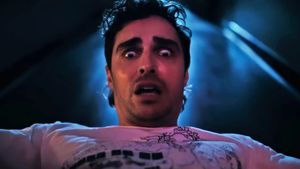








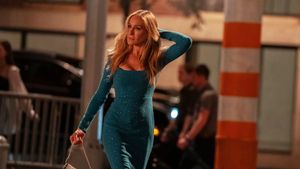



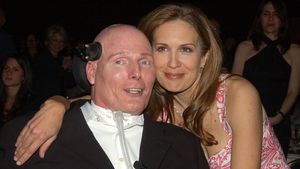

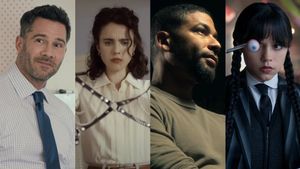










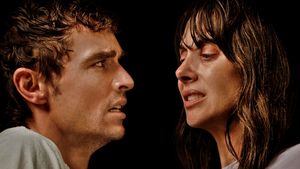

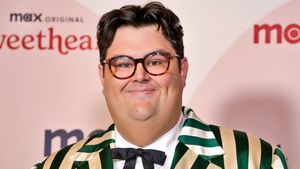

 I also took in some of our opponents' outrageous signs, including "Homo Sex Is Sin," "Your Sin of Sodomy Is Worthy of Death," and "Homosexuality Is a Threat to National Security." Although this horrific scene was familiar, I now felt almost nostalgic about it. I knew that, if all went as I hoped and expected, this could be my last encounter with such protesters. I also knew that America as a whole had moved far beyond them, that they had become almost a parody of themselves. In fact, one of Jon Stewart's correspondents from The Daily Show was standing by, ready to interview some of them for what would clearly be a satiric segment.
I also took in some of our opponents' outrageous signs, including "Homo Sex Is Sin," "Your Sin of Sodomy Is Worthy of Death," and "Homosexuality Is a Threat to National Security." Although this horrific scene was familiar, I now felt almost nostalgic about it. I knew that, if all went as I hoped and expected, this could be my last encounter with such protesters. I also knew that America as a whole had moved far beyond them, that they had become almost a parody of themselves. In fact, one of Jon Stewart's correspondents from The Daily Show was standing by, ready to interview some of them for what would clearly be a satiric segment. At left: Janson Wu and Mary Bonauto
At left: Janson Wu and Mary Bonauto



